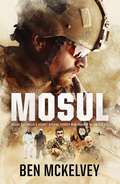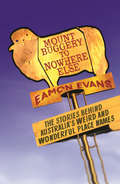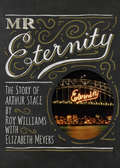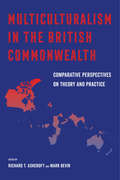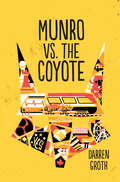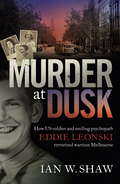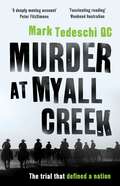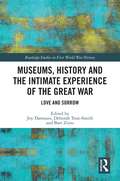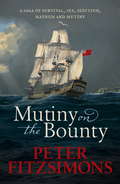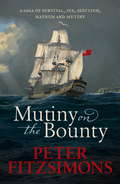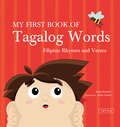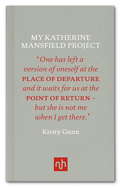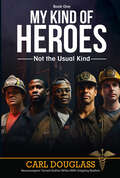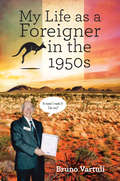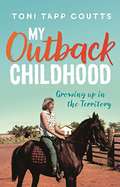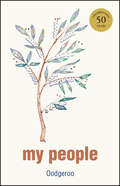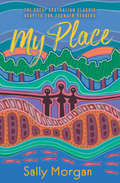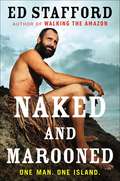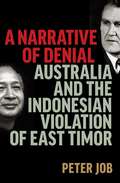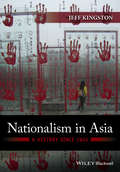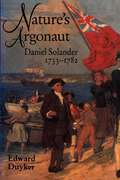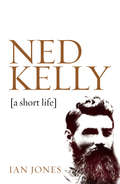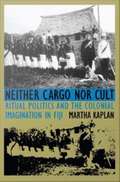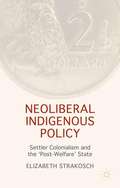- Table View
- List View
Mosul: Australia's secret war inside the ISIS caliphate
by Ben MckelveyFrom the best-selling author of The Commando and Born to Fight comes a fascinating investigation of modern warfare that combines methodical research and the fast-paced action of battle with the personal stories of the combatants on both sides of the line.Taking us from the suburbs of western Sydney and Australia's military army bases, to the battlefields of Afghanistan and Iraq, this is a remarkable book that reveals the as-yet untold story of the battle for Mosul and the secret involvement of Australians on both sides of the war - both our Commandos and Australian ISIS fighters.Mosul details the rise of ISIS influence in Australia, the Iran and Australia allegiance to fight Daesh and shows what led up to the battle and the ramifications that are still being felt at home - by our soldiers and the victims of that war.Ben Mckelvey has extraordinary access to SOOCOMD/2COMMANDO units - the most decorated modern Australian fighting unit; ISOF - Iraq's premier fighters; Yazidis women who had been slaves of ISIS; returned Commandos and their devastated families, and explains how petty criminals in Western Sydney became some of our worst jihadists who took their families to Iraq to fight for ISIS. Focusing on the stories of key figures like 2 Commando's Ian Turner and one of Australia's most infamous Jihadist, Khaled Sharrouf, Mckelvey takes us the heart of this brutal battle and brings history to life in an honest, thoughtful and compelling examination of modern warfare.A must-read for anyone interested in modern military history.
Mount Buggery to Nowhere Else: The stories behind Australia's weird and wonderful place names
by Eamon EvansThe stories behind Australia's many, many strange, inappropriate and downright hilarious place names.From Dismal Swamp to Useless Loop, Intercourse Island to Dead Mans Gully, Mount Buggery to Nowhere Else, Australia has some of the strangest, funniest, weirdest and most out-of-place names going - now described and explained in one humorous and fascinating book.Australia's vast spaces and irreverent, larrikin history have given us some of the best place names in the world. Ranging from the less than positive (Linger and Die Hill, NSW), to the indelicate (Scented Knob, WA), the idiotic (Eggs and Bacon Bay, TAS) to the inappropriate and the just plain fascinating, Mount Buggery to Nowhere Else is a toponymical journey through this nation of weird and wonderful places.
Mr Eternity: The Story of Arthur Stace
by Roy Williams Elizabeth MeyersAlmost every day for 35 years, Arthur Stace spent hours writing a single word – Eternity – on and around the streets of Sydney. Sometimes his mission took him much further afield, to country New South Wales and even to Melbourne.Stace’s identity was a mystery for more than two decades. Then, after his ‘unmasking’ in 1956, he became a reluctant folk hero. By the time he died, in 1967, his was a household name and the word Eternity was ingrained in the soul of Sydney. It still is.In this long-awaited biography, the full story of Arthur Stace’s life is told for the first time in vivid and often surprising detail. Drawing upon many original sources, some never before made public, this book will engross Christians and non-believers alike – anyone who loves a great Australian story.
Multiculturalism in the British Commonwealth: Comparative Perspectives on Theory and Practice
by Mark Bevir Richard T. AshcroftA free open access ebook is available upon publication. Learn more at www.luminosoa.org. Multiculturalism as a distinct form of liberal-democratic governance gained widespread acceptance after World War II, but in recent years this consensus has been fractured. Multiculturalism in the British Commonwealth examines cultural diversity across the postwar Commonwealth, situating modern multiculturalism in its national, international, and historical contexts. Bringing together practitioners from across the humanities and social sciences to explore the legal, political, and philosophical issues involved, these essays address common questions: What is postwar multiculturalism? Why did it come about? How have social actors responded to it? In addition to chapters on Australia, Britain, Canada, and New Zealand, this volume also covers India, Malaysia, Nigeria, Singapore, and Trinidad, tracing the historical roots of contemporary dilemmas back to the intertwined legacies of imperialism and liberalism. In so doing it demonstrates that multiculturalism has implications that stretch far beyond its current formulations in public and academic discourse.
Munro vs. the Coyote
by Darren GrothSince the sudden death of his younger sister, Evie, sixteen-year-old Munro Maddux has been having flashbacks and anger-management issues. He has a constant ache in his right hand. And there's a taunting, barking, biting voice he calls "the Coyote." Munro knows a six-month student exchange will not be the stuff of teenage dreams, but in Brisbane, he intends to move beyond his troubled past. It is there, at an assisted-living residence called Fair Go Community Village, that Munro discovers the Coyote can be silenced. Munro volunteers as a "Living Partner" and gets to know the team of residents he is assigned to. The burden Munro carries, however, is not so easily cast aside. When one of the team makes the decision to leave, the Coyote gets a new life. When a second resident is taken away, the specter of trauma and death looms larger than ever. Will Munro learn how to silence the voice? Or will the Coyote ultimately triumph?
Murder at Dusk: How US soldier and smiling psychopath Eddie Leonski terrorised wartime Melbourne
by Ian W. ShawFar away from any World War II battlefront, the citizens of Melbourne lived in fear of a serial killer - the Brownout Strangler.May 1942: Melbourne was torn between fearing Japanese invasion and revelling in the carnival atmosphere brought by the influx of 15,000 cashed-up American servicemen. But those US forces didn't guarantee safety. Not long after their arrival, the city would be gripped by panic when the body of a woman was found strangled, partially naked and brutally beaten. Six days later another woman was found dead and her body told the same horrific story. A murderer was stalking the streets. As women were warned not to travel alone, an intense manhunt ensued. Not long after a third woman was murdered, American soldier Eddie Leonski was arrested. A calculating psychopath, he had a twisted fascination with female voices, especially when they were singing . . . Acclaimed author Ian W. Shaw brings World War II Melbourne to life, and takes us into the mind of the Brownout Strangler, and a very different kind of terror.'enthralling . . . makes for a fascinating read.' Canberra Times on Ian W. Shaw's The Rag Tag Fleet
Murder at Myall Creek
by Mark TedeschiOne of the most shocking murder trials in Australia's legal history, and the tribulations of the man who conducted it 'A deeply moving account of a massacre that is a stain on our nation's soul - and the prosecutor who brought the perpetrators to justice'. Peter FitzSimons In 1838, eleven convicts and former convicts were put on trial for the brutal murder of 28 Aboriginal men, women and children at Myall Creek in New South Wales. The trial created an enormous amount of controversy because it was almost unknown for Europeans to be charged with the murder of Aborigines. It would become the most serious trial of mass murder in Australia's history. The trial's prosecutor was the Attorney General of New South Wales, John Hubert Plunkett. It proved to be Plunkett's greatest test, as it pitted his forensic brilliance and his belief in equality before the law against the combined forces of the free settlers, the squatters, the military, the emancipists, the newspapers, and even the convict population. From the bestselling author of Kidnapped and Eugenia, Murder at Myall Creek follows the journey of the man who who arguably achieved more for modern-day civil rights in Australia than anyone else before or since.
Museums, History and the Intimate Experience of the Great War: Love and Sorrow (Routledge Studies in First World War History)
by Joy Damousi Bart Ziino Deborah Tout-SmithThe Great War of 1914-1918 was fought on the battlefield, on the sea and in the air, and in the heart. Museums Victoria’s exhibition World War I: Love and Sorrow exposed not just the nature of that war, but its depth and duration in personal and familial lives. Hailed by eminent scholar Jay Winter as "one of the best which the centenary of the Great War has occasioned", the exhibition delved into the war’s continuing emotional claims on descendants and on those who encounter the war through museums today. Contributors to this volume, drawn largely from the exhibition’s curators and advisory panel, grapple with the complexities of recovering and presenting difficult histories of the war. In eleven essays the book presents a new, more sensitive and nuanced narrative of the Great War, in which families and individuals take centre stage. Together they uncover private reckonings with the costs of that experience, not only in the years immediately after the war, but in the century since.
Mutiny on the Bounty: A saga of sex, sedition, mayhem and mutiny, and survival against extraordinary odds
by Peter FitzSimonsThe mutiny on HMS Bounty, in the South Pacific on 28 April 1789, is one of history's great epics - and in the hands of Peter FitzSimons it comes to life as never before.Commissioned by the Royal Navy to collect breadfruit plants from Tahiti and take them to the West Indies, the Bounty's crew found themselves in a tropical paradise. Five months later, they did not want to leave. Under the leadership of Fletcher Christian most of the crew mutinied soon after sailing from Tahiti, setting Captain William Bligh and 18 loyal crewmen adrift in a small open boat. In one of history's great feats of seamanship, Bligh navigated this tiny vessel for 3618 nautical miles to Timor.Fletcher Christian and the mutineers sailed back to Tahiti, where most remained and were later tried for mutiny. But Christian, along with eight fellow mutineers and some Tahitian men and women, sailed off into the unknown, eventually discovering the isolated Pitcairn Island - at the time not even marked on British maps - and settling there.This astonishing story is historical adventure at its very best, encompassing the mutiny, Bligh's monumental achievement in navigating to safety, and Fletcher Christian and the mutineers' own epic journey from the sensual paradise of Tahiti to the outpost of Pitcairn Island. The mutineers' descendants live on Pitcairn to this day, amid swirling stories and rumours of past sexual transgressions and present-day repercussions. Mutiny on the Bounty is a sprawling, dramatic tale of intrigue, bravery and sheer boldness, told with the accuracy of historical detail and total command of story that are Peter FitzSimons' trademarks.
Mutiny on the Bounty: A saga of sex, sedition, mayhem and mutiny, and survival against extraordinary odds
by Peter FitzSimonsThe mutiny on HMS Bounty, in the South Pacific on 28 April 1789, is one of history's truly great stories - a tale of human drama, intrigue and adventure of the highest order - and in the hands of Peter FitzSimons it comes to life as never before.Commissioned by the Royal Navy to collect breadfruit plants from Tahiti and take them to the West Indies, the Bounty's crew found themselves in a tropical paradise. Five months later, they did not want to leave. Under the leadership of Fletcher Christian most of the crew mutinied soon after sailing from Tahiti, setting Captain William Bligh and 18 loyal crewmen adrift in a small open boat. In one of history's great feats of seamanship, Bligh navigated this tiny vessel for 3618 nautical miles to Timor.Fletcher Christian and the mutineers sailed back to Tahiti, where most remained and were later tried for mutiny. But Christian, along with eight fellow mutineers and some Tahitian men and women, sailed off into the unknown, eventually discovering the isolated Pitcairn Island - at the time not even marked on British maps - and settling there.This astonishing story is historical adventure at its very best, encompassing the mutiny, Bligh's monumental achievement in navigating to safety, and Fletcher Christian and the mutineers' own epic journey from the sensual paradise of Tahiti to the outpost of Pitcairn Island. The mutineers' descendants live on Pitcairn to this day, amid swirling stories and rumours of past sexual transgressions and present-day repercussions. Mutiny on the Bounty is a sprawling, dramatic tale of intrigue, bravery and sheer boldness, told with the accuracy of historical detail and total command of story that are Peter FitzSimons' trademarks.
My First Book of Tagalog Words
by Liana Romulo Jaime LaurelIn the age-old tradition of teaching language through rhyme and verse, My First Book of Tagalog Words introduces Philippine language and culture to preschool children in a playful and non-intimidating way. The ABC structure provides a familiar framework that encourages fun and easy learning. Its bold and bright illustrations aim to make children laugh and enjoy the learning process.
My Katherine Mansfield Project
by Kirsty GunnIn 2009, Kirsty Gunn returned to spend the winter in her hometown of Wellington, New Zealand, also the place where Katherine Mansfield grew up. In this exquisitely written "notebook," which blends memoir, biography, and essay, Gunn records that winter-long experience and the unparalleled insight it allowed her into Mansfield's fiction. Gunn explores the idea of home and belonging--and of the profound influence of Mansfield's work on her own creative journey. She asks whether it is even possible to "come home"--and who are we when we get there?
My Kind of Heroes: Not the Usual Kind—Book One
by Carl DouglassMy Kind of Heroes is the inaugural work in a compelling seven-book series by Carl Douglass, Neurosurgeon Turned Author who Writes With Gripping Realism. Carl offers a fresh take on heroism through the lens of lesser-known but equally impactful figures. My Kind of Heroes steps away from the common hero narrative that focuses on the realms of sports, entertainment, or high-profile leaders. Instead, Douglass spotlights individuals whose significant contributions have been overlooked or underappreciated. My Kind of Heroes is a collection of concise historical profiles that shine a light on individuals chosen for their quiet influence and meaningful actions, rather than their fame. Douglass's work is a tribute to those who have acted heroically without seeking the limelight—people whose stories, though not often in the headlines, are rich with inspiration and deserve our recognition and appreciation. While platforms like CNN celebrate modern-day heroes, Douglass's My Kind of Heroes stands out by broadening the definition of heroism. It goes beyond the widely recognized heroes to honor those who have made a difference behind the scenes. This unique perspective sets the stage for the six volumes to follow, inviting readers to expand their understanding of heroism and the remarkable individuals who embody it.
My Life as a Foreigner in the 1950s
by Bruno VartuliAs a young man in Italy's Southern Calabria, Bruno Vartuli dreamed of starting a new life in a new land. On his arrival in Australia in the 1950s Bruno struggled to understand the language and culture, but with tremendous strength and perseverance he overcame each adversity and achieved amazing results. This personal story of assimilation and integration highlights the importance of equality in society and inspires us to embrace the differences between people with dignity and compassion.
My Outback Childhood (younger readers): Growing up in the Territory
by Toni Tapp CouttsThere was something interesting around every corner, be it brumbies and wild donkeys disappearing through the bush, or a little waterhole where the snakes and kangaroos came to drink.Toni's childhood isn't like other kids'. She is only five years old when her mum packs a small suitcase and takes the family over 300 kilometres on a scratchy dirt track to live at Killarney, a remote cattle station in the Northern Territory. Toni grows up among the cattle and horses, with the wild Territory climate and even wilder native animals around her. She has adventures with Old Dora and Daisy, the Aboriginal women who help raise her and her brothers and sisters. They teach her about bush tucker and tell her stories of debil debils.My Outback Childhood is the story of Toni's unconventional upbringing on Killarney - stalking goannas, helping in the cattle yards, riding horses and sleeping under the stars. Young readers will be captivated by this true story of a childhood filled with Outback adventures. Fascinating for city kids and country children alike, this is a unique story that educates as well as entertains.
My People
by OodgerooImmerse yourself in the poetry of one of Australia’s foremost Indigenous artists My People is a compilation of the poetry of Oodgeroo, of the tribe Noonuccal, Custodian of the land Minjerribah. This collection of captivating poetry detailing the struggle of Australia’s Indigenous peoples is more relevant today than ever before. While she passed away in 1993, Oodgeroo remains one of Australia’s most influential Aboriginal poets. Her poetry leaves little room to argue why that shouldn’t be the case. Razor-sharp and incisive, while simultaneously haunting and beautiful, Oodgeroo’s poems will enchant both young and old alike. My People is a bewitching collection of Oodgeroo’s poems that belongs on the bookshelves of every art lover and anyone with an appreciation of the written word.
My Place for Younger Readers: My Place For Young Readers - Part 3
by Sally MorganSince its publication in 1987, Sally Morgan's My Place has sold more than half a million copies in Australia, been translated and read all over the world, and been reprinted dozens of times. Sally's rich, zesty and moving work is perhaps the best loved biography of Aboriginal Australia ever written. My Place for Younger Readers is an abridged edition that retains all the charm and power of the original.
Naked and Marooned
by Ed StaffordWhat do you do after you walk the Amazon? Ed Stafford--adventurer extraordinaire and Guinness World Record holder for walking the length of the Amazon River--likes a challenge. Casting about for an adventure that would top the extraordinary feat he recounts in Walking the Amazon, Stafford decides to maroon himself on an uninhabited island in the South Pacific. His mission: to survive for sixty days equipped with nothing--no food, water, or even clothing--except the video cameras he would use to document his time. Detailing Stafford's jaw-dropping sojourn on the island of Olourua, Naked and Marooned is a tale of unparalleled adventure and of one man's will to push himself to the outer limits--and survive.
Narrative of Denial: Australia and the Indonesian Violation of East Timor
by Peter JobThe Indonesian invasion of East Timor in 1975 led to a prolonged conflict, severe human rights abuses and a large loss of life. From 1975 to 1983 the Indonesian military's campaign of 'encirclement and annihilation' destroyed rural food resources, creating the famine that took most of the lives lost during the occupation. The Australian governments of Gough Whitlam and Malcolm Fraser presented themselves as advocates for human rights and the international rule of law, while viewing relations with Indonesia as key to their foreign policy objectives. These positions came into conflict due to the Indonesian invasion of East Timor. Based upon an extensive study of Australian foreign affairs archives, as well as interviews, A Narrative of Denial demonstrates how the Australian government responded to the conflict by propagating a version of events that denied the reality of the catastrophe occurring in East Timor. It worked to protect the Suharto regime internationally, thereby allowing it to continue its repression relatively unhindered. This remarkable story will unsettle existing perceptions of how Australia operates in world affairs.
Nationalism and Human Rights
by Grace ChengThis collection of essays offers a comprehensive discussion of the challenge of promoting human rights in the face of nationalism's persistence as an ideological and mobilizational force in politics.
Nationalism in Asia: A History Since 1945
by Jeff KingstonUsing a comparative, interdisciplinary approach, Nationalism in Asia analyzes currents of nationalism in five contemporary Asian societies: China, India, Indonesia, Japan, and South Korea. Explores the ways in which nationalism is expressed, embraced, challenged, and resisted in contemporary China, India, Indonesia, Japan, and South Korea using a comparative, interdisciplinary approach Provides an important trans-national and trans-regional analysis by looking at five countries that span Northeast, Southeast, and South Asia Features comparative analysis of identity politics, democracy, economic policy, nation branding, sports, shared trauma, memory and culture wars, territorial disputes, national security and minorities Offers an accessible, thematic narrative written for non-specialists, including a detailed and up-to-date bibliography Gives readers an in-depth understanding of the ramifications of nationalism in these countries for the future of Asia
Nature's Argonaut: Daniel Solander 1733-1782
by Edward DuykerNature's Argonaut is the first full biography of this important eighteenth-century naturalist who not only circled the globe under sail but ranged as far north as the Arctic and as far south as Tierra del Fuego. Edward Duyker pays particular attention to Solander's role as a naturalist on the Endeavour during the ship's voyage along the east coast of Australia and to his pioneering contribution to the scientific study of the new continent. The author has also provided a comprehensive account of Solander's life and his contribution to the foundations of modern plant and animal taxonomy. The life of Daniel Solander, stamped with the enquiring spirit of the Enlightenment, is one of the grand adventures of the eighteenth century. Aside from the historic Endeavour voyage, Solander's Arctic travels, his involvement in industrial espionage in England on behalf of Sweden, his thwarted love for the daughter of his mentor Linnaeus and his friendships with such men as Joseph Banks, James Cook, Samuel Johnson, Matthew Boulton and Benjamin Franklin make Solander an exciting biographical subject.
Ned Kelly: A Short Life
by Ian Jones'the best Kelly biography by a country mile' - The AustralianThe definitive biography of Ned Kelly - and a superb description of his times. A bestseller since it was first published, Ned Kelly: A Short Life is acknowledged as being the definitive biography. Ian Jones combines years of research into all the records of the era and exhaustive interviews with living descendants of those involved, to present a vivid and gripping account of one of Australia's most iconic figures. `It will probably stand as the definitive account of Kelly?s life and its meaning?a work of prodigious scholarship, vivid reportage and sharp analysis?the most detailed portrait of the outlaw ever written? - Rod Moran, West Australian`the definitive biographical work? - Dr John McQuilton, author of The Kelly Outbreak
Neither Cargo Nor Cult
by Martha KaplanIn the 1880s an oracle priest, Navosavakadua, mobilized Fijians of the hinterlands against the encroachment of both Fijian chiefs and British colonizers. British officials called the movement the Tuka cult, imagining it as a contagious superstition that had to be stopped. Navosavakadua and many of his followers, deemed "dangerous and disaffected natives," were exiled. Scholars have since made Tuka the standard example of the Pacific cargo cult, describing it as a millenarian movement in which dispossessed islanders sought Western goods by magical means. In this study of colonial and postcolonial Fiji, Martha Kaplan examines the effects of narratives made real and traces a complex history that began neither as a search for cargo, nor as a cult. Engaging Fijian oral history and texts as well as colonial records, Kaplan resituates Tuka in the flow of indigenous Fijian history-making and rereads the archives for an ethnography of British colonizing power. Proposing neither unchanging indigenous culture nor the inevitable hegemony of colonial power, she describes the dialogic relationship between plural, contesting, and changing articulations of both Fijian and colonial culture. A remarkable enthnographic account of power and meaning, Neither Cargo nor Cult addresses compelling questions within anthropological theory. It will attract a wide audience among those interested in colonial and postcolonial societies, ritual and religious movements, hegemony and resistance, and the Pacific Islands.
Neoliberal Indigenous Policy: Settler Colonialism and the 'Post-Welfare' State
by Elizabeth StrakoschNeoliberal Indigenous Policy
